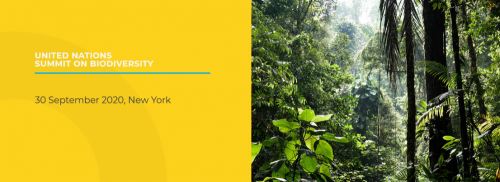
https://www.un.org/pga/74/united-nations-summit-on-biodiversity/
Our societies are intimately linked with and depend on biodiversity. Biodiversity is essential for people, including through its provision of nutritious food, clean water, medicines, and protection from extreme events. Biodiversity loss and the degradation of its contributions to people jeopardize progress towards the Sustainable Development Goals (SDGs) and human wellbeing. The evidence of these connections is clear.
The COVID-19 pandemic has further highlighted the importance of the relationship between people and nature. We are reminded that when we destroy and degrade biodiversity, we undermine the web of life and increase the risk of disease spillover from wildlife to people. Responses to the pandemic provide a unique opportunity for transformative change as a global community. An investment in the health of our planet is an investment in our own future.
The Summit will highlight the crisis facing humanity from the degradation of biodiversity and the urgent need to accelerate action on biodiversity for sustainable development. It will provide an opportunity for Heads of State and Government and other leaders to raise ambition for the development of the post-2020 global biodiversity framework to be adopted at the 15th Conference of Parties to the Convention on Biological Diversity in 2021. This framework, and its effective implementation, must put nature on a path to recovery by 2030 to meet the SDGs and realize the Vision of “Living in harmony with nature”.
As we approach the end of the UN Decade on Biodiversity 2011-2020, progress towards global biodiversity targets including those of the SDGs has been insufficient. While there are many local examples of success, biodiversity is declining globally at rates unprecedented in human history, with growing impacts on people and our planet.
Recent assessments by the Intergovernmental Science-Policy Platform on Biodiversity and Ecosystem Services (IPBES) concluded that species extinction rates are tens to hundreds of times higher now than historical averages, that:
75% of the Earth’s land surface has been significantly altered by human actions, including for example the loss of 85% of the area of wetlands
66% of the ocean area is experiencing multiple impacts from people, including from fisheries, pollution, and chemical changes from acidification
The 75th anniversary of the United Nations, the start of the UN decade of action and delivery on SDGs, and the UN Decades on ecosystem restoration and on ocean science for sustainable development, among others, provide additional context for the Summit. Together, they remind us of the urgent need to recognize our dependence on a healthy planet and to work together for transformative change.
The Summit is an opportunity to demonstrate leadership and commitment to improve our relationship with nature, addressing the causes of change, and ensuring that biodiversity and the contributions it provides to all people are at the heart of sustainable development and the fight against climate change










Add new comment